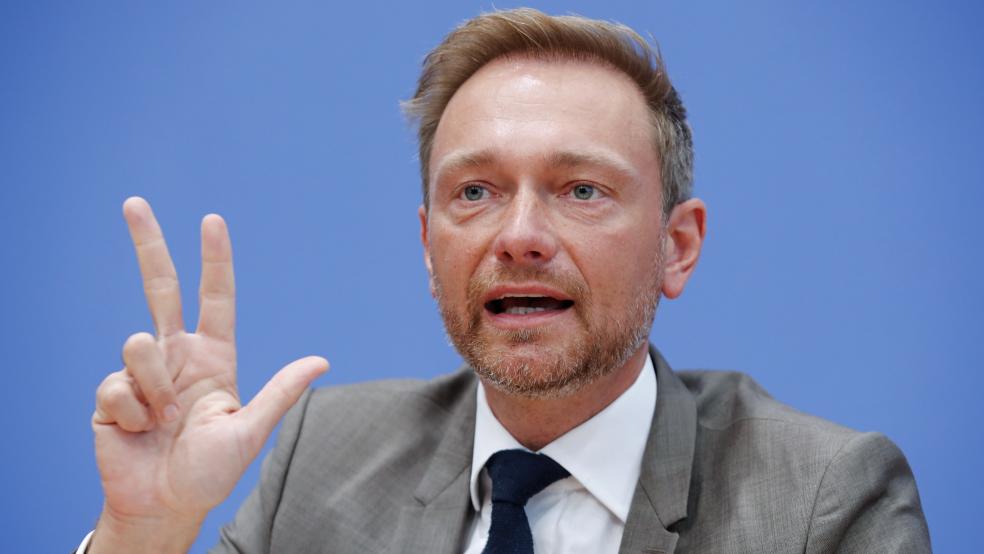Merkel opened what promise to be marathon coalition talks on Friday, hoping to bring three opposing political camps into a stable government despite signs there would be less money to paper over differences. Further talks to discuss tax, finances and Europe are planned for Tuesday.
Merkel said she was hoping to complete exploratory talks -- an initial stage during which parties decide whether to go ahead with full-blown coalition negotiations -- by Nov. 17 or 18, participants in a meeting of her conservative bloc said.At that point the conservative sister parties, the liberal Free Democrats (FDP) and the Greens should have a document that lays out the rough outlines of what a coalition would work on, the participants cited Merkel as saying.Cem Ozdemir, leader of the environmentalist Greens, welcomed a proposal by the FDP for global action to make it harder for large technology companies to book their taxes in more favorable jurisdictions."I'm pleased that FDP leader Christian Lindner has moved on this, saying that Internet companies for example should be more strongly and fairly taxed," said Ozdemir, highlighting progress made in an area where the two parties had been far apart."It cannot be right that Amazon and Apple use Europe as a location and use its infrastructure, but refuse to contribute appropriately to its financing even as every bookseller is chased down if he doesn't pay tax on time," he added.Lindner, whose party advocates low tax and fiscal discipline, also called for deeper cooperation within the European Union and the Group of 20 leading economies to make global firms pay more tax.The ability of international companies to minimize their tax liabilities by booking profits in lower-tax jurisdictions has come under the spotlight in recent years as cash-strapped states struggle to finance expanding social and security liabilities."I can imagine tax increases for companies like Apple," Lindner told the Sueddeutsche Zeitung newspaper, in an apparent sacrifice of one of his party's shibboleths to smooth the path towards an unprecedentedly tricky three-way coalition.Merkel's conservatives suffered punishing losses in this month's national election, forcing them to patch together a heterogeneous three-way coalition with few precedents in Germany's post-war history. The potential three-way pact has been dubbed a "Jamaica" coalition because the three parties' colors -- black, yellow and green -- match those of the Jamaican flag.The Greens want to boost infrastructure and environment spending, but the FDP and fiscal hawks in the conservative camp view spending proposals with concern. The talks, which continue tomorrow, are set to drag on until at least the end of the year. Merkel's Christian Democrat party estimates that the smaller parties' tax and spending proposals would cost as much as 100 billion euros ($117.37 billion) over the next four years, three times what its expert reckon is available. Senior conservative Volker Kauder said if the three-way alliance agreed to govern together it would stick to the "black zero" -- or balanced budget -- that was a hallmark of outgoing Finance Minister Wolfgang Schaeuble's tenure."You can assume that we will of course make the balanced budget an object of coalition negotiations if they happen," he said ahead of a meeting of the conservatives in parliament."And in the exploratory talks it was not disputed at all: There will be no new debt. We'll stick to the black zero."German newspaper Handelsblatt cited an internal finance ministry paper as saying the new government should "preferably" use the roughly 30 billion euros of leeway for tax cuts, infrastructure investment -- especially expanding the broadband network -- and tackling the causes of migration.It said all further measures should completely come out of the budgets of the sector they relate to and should be financed either by higher revenues or cuts in other areas.The Finance Ministry was not immediately available to comment on the report. Transport Minister Alexander Dobrindt, a conservative, told Bild newspaper that immigration limits, social benefits and the future of Europe remained big areas of conflict.Lindner maintained the hard line on Greece that his party is known for, saying that any country that took a debt haircut would need to leave the euro zone. (Reporting by Thomas Escritt, Andrea Shalal and Andreas Rinke; Writing by Thomas Escritt and Michelle Martin; Editing by Catherine Evans)Germany's coalition-seeking Greens and liberals find common ground on tax

Wolfgang Rattay



